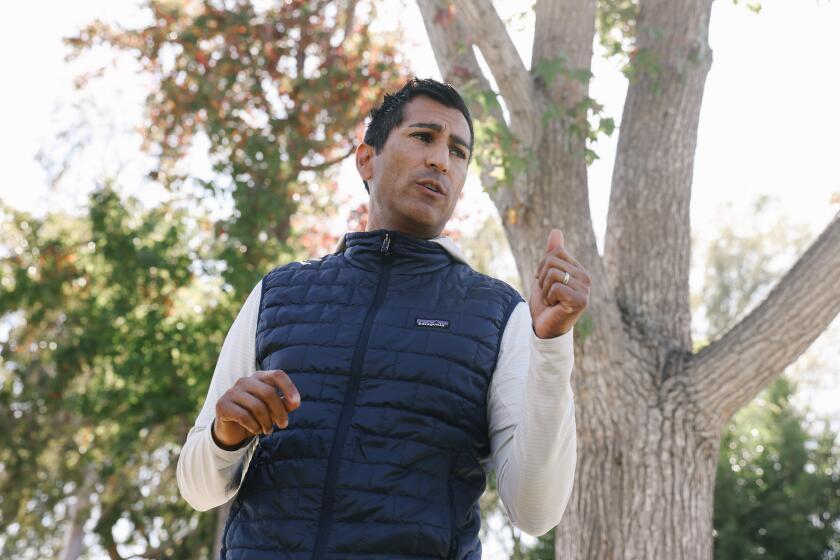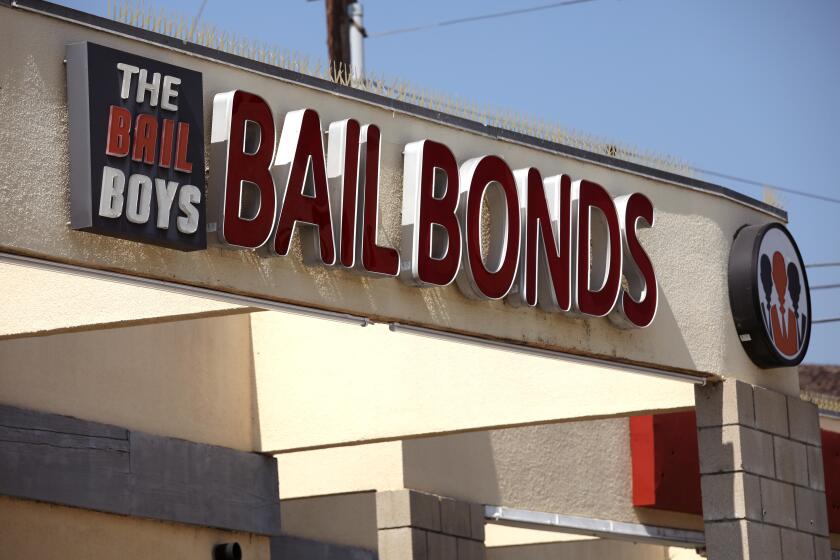Editorial: Don’t believe the nonsense. The criminal justice system worked properly in Venice assaults

- Share via
On Saturday, April 6, at about 10:30 p.m., a woman was brutally assaulted as she walked near the Venice canals. Another woman was attacked nearby about an hour later. Both were hospitalized.
Los Angeles police responded quickly, working with members of the Venice community to identify the suspect. Anthony Jones, 29, of Las Vegas was arrested in San Diego on April 12 and charged by L.A. County Dist. Atty. George Gascón with rape, sodomy, mayhem, torture and attempted murder. The D.A.’s office insisted that no bail be allowed and is pursuing a life sentence.
Public safety challenges are being improperly used to roll back criminal justice reforms. The next generation of leaders must show wisdom and backbone.
City Councilmember Traci Park, whose district includes Venice, placed the blame on a decade of criminal justice reforms.
“I am sick and tired of living in the middle of a failed social experiment,” Park said, adding:
“Enough with the ridiculous soft-on-crime, defund-the-police, catch-and-release, harm-reduction, criminals-are-the-victims policies that got us into this mess. Enough.”
It could work better, though. New data show eliminating money bail for most defendants in Los Angeles County did not increase repeat arrests. But not as many people are being released as expected.
Park lives in Venice, and she noted that she or any of her friends could have been the victims of the attacks, so it might be tempting to cut her a bit of slack for her comment.
Furthermore, her words capture frustrations and anxieties many residents of Los Angeles feel about public safety.
But the statement is widely off-base and egregiously misleading, and falls short of the standard that should be expected of elected officials. None of Park’s “failed social experiment” allegations fits the horrible Venice attacks or the aftermath.
Gascón has to articulate his progress in building a more just and equitable criminal justice system, as voters wanted when they first elected him.
Jones had no arrest record in L.A. and was not the beneficiary of any supposedly “soft-on-crime” policy that abetted his alleged actions in Venice. He was quickly arrested and charged to the fullest possible extent.
L.A. police have seen a reduction in the number of sworn officers, requiring a large amount of overtime pay to get the job done. But the department has not been “defunded” in any sense, and the city budget is in fact under strain from the substantial pay increase Mayor Karen Bass offered in order to improve officer recruitment and retention. In any case, police had the investigative expertise and personnel to swiftly identify Jones and make the arrest.
While some Democrats and Republicans are backing away from efforts to shrink the prison population and reduce excessive sentences, conservatives are again a crucial force for criminal justice reform.
“Catch-and-release?” Hardly. Jones was not a released inmate or suspect, and it’s now unlikely he will ever again be free from custody, assuming police arrested the right person.
And, importantly, he is not an outlier. Contrary to anti-reform folklore, no one charged with a dangerous felony is simply let go unless they can raise a lot of money for bail. In the Venice case, as with many other cases of attempted murder and sexual assault, the district attorney said he’d ask that Jones be held without bail at all.
“Harm-reduction,” or providing help and overdose prevention to drug users, does not apply to Jones. There was no reported evidence of substance use.
Lawmakers aren’t letting the lack of useful data on the causes of retail theft stop them from pushing solutions to a problem they can’t define.
And as for the “criminals-are-the-victims” claim, that substance-free broadside against criminal justice reform does not describe any actual policy of the police, prosecutors or courts in L.A.
Crime in Los Angeles is real, it hurts people and the community, and it is a problem that requires constant vigilance. Just as critics of needed justice reforms are often off-target, so are those who argue that there is no crime, we don’t need police and everything’s fine.
The last several weeks have seen reports of astonishing crimes, including a woman apparently disturbed by the impending solar eclipse who police say stabbed her boyfriend and threw her children from her car onto the freeway; a $30-million Easter Sunday cash heist; and freeway jewelry robberies linked to South American criminals here on tourist visas. A sheriff’s deputy was charged with stealing from drivers and pedestrians. On Sunday, an intruder was arrested inside Bass’ home. April alone provides enough fodder for several seasons’ worth of TV dramas.
The ‘three strikes’ law led to an overcrowded prison system, exacerbated the justice system’s racial disparities and brought California to the brink of insolvency.
None of these, though, nor the Venice assaults besides, appear to be linked to any supposedly soft-on-crime policy. Or to what Park called a “failed social experiment.”
Nearly four years ago, following the police murder of George Floyd in Minneapolis, philosophy professor (and now presidential candidate) Cornel West called the United States itself a failed social experiment, in large part because he said its justice system could not adequately protect rights and liberties, especially for people without privilege.
Three bills to roll back or repeal Proposition 47 are grounded in fear and falsehoods and should be rejected.
He was right that the justice system needs improvement. He was wrong to call the American experiment a failure, and Park is similarly wrong about attempts to improve it. Criminal justice reform is not a departure from the long tradition of American justice, but a continuation of the necessary work to constantly redeem, refine and perfect it. Impediments to that work have always included racism, politics and self-interest.
They also include sloppy thinking, misleading assertions about crime and policy based on anxieties rather than facts. Los Angeles is not well-served by attempts to falsely link reform policies to crimes they have nothing to do with.
More to Read
A cure for the common opinion
Get thought-provoking perspectives with our weekly newsletter.
You may occasionally receive promotional content from the Los Angeles Times.

















